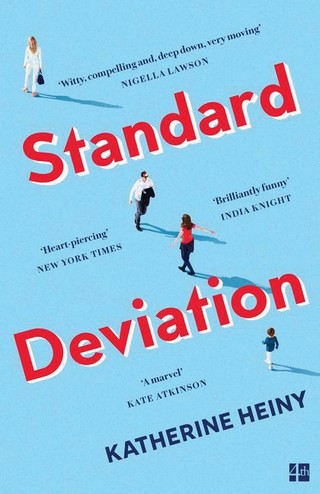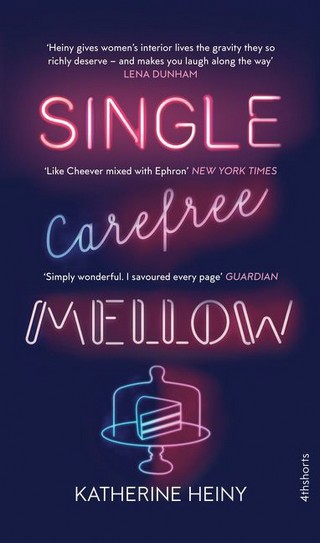Standard Deviation
Recently in this column, I wrote about Earlier Morning Riser by Katherine Heiny, which I so loved that I went on to her two previous titles. Single, Carefree, Mellow is a book of short stories with some characters appearing in one or more of the stories. I know some people are put off by the idea of the short stories—but these are great. All the stories are good—thought-provoking and thoroughly entertaining. I have trouble choosing any one in particular—but That Dance That You Do, with an harassed mother trying to organise a birthday party for her six-year-old son, and leaping the many obstacles in her way of achieving this event, and the title story, Single, Carefree, Mellow, where Maya’s dog is dying and she is leaving her husband—undecided about who she will miss most, do stand out. Heiny’s second novel, Standard Deviation, I find hard to write about—it is so good. One reason I find it difficult is that Audra, the main character, resembles me too much—she’s loud, will talk to anyone, and noses out family secrets in no time flat. Sadly when, on the odd occasion, I discover myself in a book, it is rarely flattering. Nevertheless, there Audra is. The beginning chapter suggests that Audra and her husband Graham, live in separate universes which has an impact on their family life. It is a second marriage for Graham, and when his first wife, Elspeth, re-enters his life, and therefore Audra’s, things start to happen. This is such a wonderful book, I put off finishing it for awhile, because I didn’t want all these people to leave my life, especially Audra and Graham’s son, origami obsessive, Matthew. In fact the Origami story is one of my favourite parts of the book. Eagerly awaiting the next book from this very talented writer.
A very different book is The Covered Wife. Lisa Emanuel’s debut novel places you in one of those situations of having to choose what means the most—what would you give up to have the other thing on offer. This is another difficult book to write about, but by far a different reason. Set in Sydney, Sarah is a young lawyer, working in a top law firm at Circular Quay. She leads a quiet life, immersed in her work, not given to socialising. One evening, after work, Tali, a woman who sits at the next desk, talks her into going for a drink with the crowd. There, Sarah meets Daniel—a barrister who works for a different law firm. Their relationship develops very quickly, finding that they have a lot in common, especially both being Jewish. His family turns out to the large, noisy loving family that Sarah never had, and she falls even more in love. Daniel introduces her to Rabbi Menachem Lev and his wife Cheni, and together, Sarah and Daniel start attending the progressive synagogue near the beach. At first Sara loves it, and becomes completely involved. The beachside synagogue has become too big for the site, so a decision is made to move to the Blue Mountains, and for all the adherents to move there, including Sarah and Daniel. In fact, it seems that Daniel has been chosen for a leadership role and Sarah is expected to be his partner, in every respect. After the birth of their son, Jossi, Sarah tries to be the Good Jewish mother and wife, but as more things are revealed about the situation in the mountains, she realises that this is a place she would rather not be. I loved this book—I have always been interested in Judaism, fascinated by the history and the archeology. The decision that Sarah has to make is not one that I would have liked to make.
I have loved all of Lisa Genova’s novels. Ones like Still Alice on dementia, Inside the O’Briens—Huntington’s Disease, and Every Note Played about ALS. She writes with such compassion and understanding of what the sufferers are going through. As I am, at the moment, the carer for my sister Barbara who has a form of dementia that has taken her short term memory, I was very interested in her latest non-fiction book, Remember. Lisa holds a degree in biopsychology and a PHD in neuroscience from Harvard. I found the book very helpful—she explains everything exactly in layman’s terms, but in an approachable way. While there were maybe a few more technical terms I may have had a problem with, there were remarkably few for a non-science person like me. Genova explains the different forms of memory, how we can improve it and what to do when it starts to fail. I wanted to write about this book, not only for my sister, but for myself, to help me to understand what she is going through—and not get angry when telling her the time/date day every five minutes. I try very hard to put myself in her place, but it is not always easy. Genova’s book really opened my eyes to a lot of new attitudes and ways to respond to my sister. Genova is a gifted writer and a very special person. FYI, I have just read online that Inside the O’Briens is being made into a film. Looking forward to it.
Very quickly, a few words about Australian author, Katherine Brabon’s new book, The Shut Ins. These shut ins, or hikikomori, are recluses who never leave their rooms for years. Mai and Hikaru went to school together, and when Mai catches up with him later and finds he has become a hikikomori, she decide to try and encourage him to leave his room. This is a very Japanese book, in away it reminded me of Convenience Store Woman by Sayaka Murata, one of my all time favourites. Highly recommended. Janice Wilder






